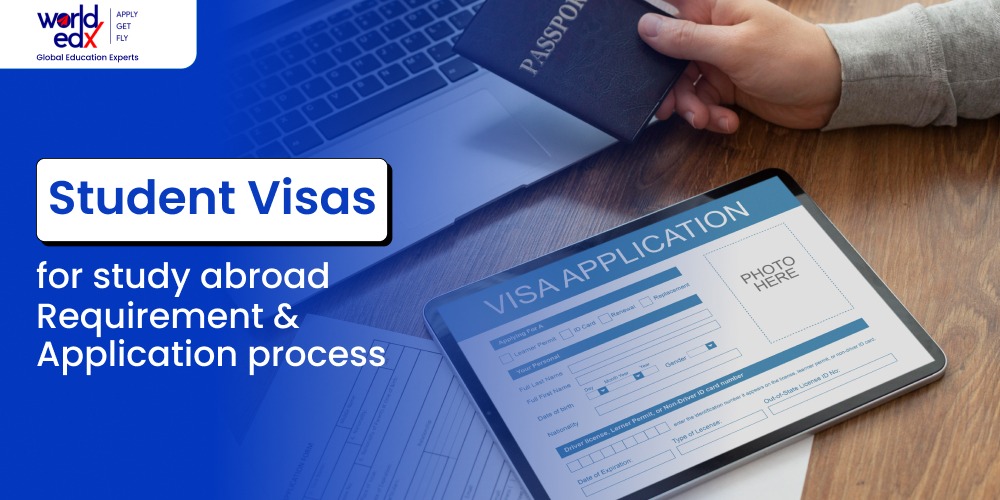For many students, studying abroad offers an exciting chance to experience different cultures, improve their perspectives, and get a top-notch education. However, getting a student visa is a significant factor before starting the journey. Let’s take a closer look at this crucial component.
What is a Student Visa?

A student visa is a type of visa especially for individuals who intend to study at an educational institution in a foreign country. Generally, this visa is necessary for students enrolled in long-term courses like degree programs, but it may also be required for certain short-term studies. The conditions and duration of a student visa vary depending on the destination country and the course of study. Different countries offer various types of student visas, often categorized based on the course duration and type.
Student visas are usually temporary and are granted for the duration of the academic program. Some countries may also allow students to work part-time during their studies to help support themselves. It’s important for individuals planning to study abroad to carefully review the requirements and guidelines of the specific country they plan to study in and apply for the appropriate student visa well before their planned start date.
Student Visa Requirements
The requirements for student visas can vary depending on the country you want to study in but some general requirements are common to most countries. Here are a few of the most common requisites:
- A valid passport: Your passport must be valid for at least six months beyond the end of your study program.
- An acceptance letter from a recognized educational institution: This letter should show that you have been accepted to a program of study at a recognized educational institution in the country you want to study in.
- Proof of financial support: You need to prove that you have the financial resources to support yourself while you study. This could include bank statements, scholarships or letters of sponsorship from your parents or other financial supporters.
- Health insurance: You will need to have health insurance that is valid in the country you will be studying in.
- English language proficiency: Many countries require students to demonstrate English language proficiency by taking a test like the TOEFL or IELTS.
- Visa application fee: A visa application fee needs to be paid.
- Academic Records: Transcripts, diplomas, degrees or certificates from schools attended.
- Passport-sized photographs: You will need to submit several passport-sized photographs with your application.
How to Apply for a Student Visa?
Before you apply for a student visa, you need to be accepted by an educational institution in the destination country. This institution must be recognized by the government of that country. This institution will often provide you with an acceptance letter, which is crucial for your visa application.
- Understand the Visa Requirements: Each country has different requirements for its student visas. You should check the official immigration or embassy website of the country you wish to study in for the most accurate and detailed information.
- Prepare Your Documents: Prepare and keep the documents ready. You can go through the required documents listed above under Student Visa Requirements.
- Pay the Visa Application Fee: An application fee for a visa is usually non-refundable. Every country has a different fee and process.
- Attend an Interview: Many countries demand a visa interview. During the interview, be prepared to answer questions about your study plans, how you will fund your education, and your intentions after you finish your studies.
- Wait for Visa Processing: The processing time for a student visa can vary greatly depending on the country and time of year. It’s advisable to apply as early as possible, considering the processing time.
- Prepare for Arrival: Once you receive your visa, make travel arrangements and understand the rules and regulations associated with your student visa, including work restrictions and reporting requirements.

Country-wise Student Visas
Australia
For those aspiring to study in Australia, obtaining a Subclass 500 Student Visa is essential. The Department of Home Affairs is the granting authority for Australian visas. It allows international students to pursue full-time study at recognized institutions. With this visa, students can enjoy work opportunities during terms and breaks, enhancing their academic experience while supporting themselves financially. To apply, aspiring students must first secure Confirmation of Enrolment (CoE) from an eligible institution, demonstrate sufficient funds for tuition and
living expenses, and acquire Overseas Student Health Cover (OSHC).
For More Info – Australia Student Visa
Canada
In Canada, international students obtain a Study Permit, regulated by Immigration, Refugees and Citizenship Canada (IRCC). To qualify for a Study Permit, applicants must first receive acceptance into a Designated Learning Institution (DLI), ensuring that the institution meets the Canadian government’s educational standards. Additionally, applicants must present proof of financial support to cover tuition fees, living expenses and other associated costs during their stay in Canada. While focusing on academics, students can also work part-time during term and full-time during scheduled breaks, gaining valuable work experience.
New Zealand
For international students seeking to pursue their studies in New Zealand, obtaining a Student Visa is essential. Administered by Immigration New Zealand, the Student Visa enables students to study full-time at approved educational institutions in the country. To qualify for a Student Visa, applicants must first receive an offer of place from a New Zealand education provider. This ensures that the institution meets the standards set by the New Zealand government for educational quality and student welfare. The Student Visa for New Zealand offers international students the opportunity to experience a high-quality education system in a safe and welcoming environment.
United Kingdom
The UK offers Tier 4 (General) Student Visas, administered by UK Visas and Immigration (UKVI). To qualify for a Tier 4 Student Visa, applicants must first receive a Confirmation of Acceptance for Studies (CAS) from a licensed Tier 4 sponsor. This confirms their acceptance into a specific course of study at a registered UK institution. One notable aspect of the Tier 4 Visa is that it may allow students to work part-time during term and full-time during scheduled breaks, providing opportunities to get real-world experience and financially support themselves while studying in the UK.
For More Info – UK Student Visa Interview Questions
United States
In the United States, international students obtain F-1 Visas (for academic studies) or M-1 Visas (for vocational studies), granted by the U.S. Department of State. Applicants must gain acceptance into a Student and Exchange Visitor Program (SEVP)-approved school, demonstrate financial support, and intend to return home after completing studies. The visa application (DS-160) is completed online, followed by an interview at the nearest U.S. embassy or consulate. The F-1 and M-1 Visas offer international students the opportunity to access world-renowned educational institutions, diverse academic programs, and cultural experiences in the United States.
For More Info – US Student Visa Rejection
Ireland
Administered by the Irish Naturalisation and Immigration Service (INIS), the Study Visa allows students to pursue full-time courses of study at accredited educational institutions in Ireland. For international students looking to pursue their studies in Ireland, obtaining a student visa, also known as a Study Visa or D Visa is an essential step. Once granted, the Study Visa allows students to study full-time at their approved institution for the duration of their course. Applicants are advised to visit the Irish Naturalization and Immigration Service’s official website (INIS) for the most recent requirements and complete details.
Germany
To be eligible to study in Germany, students require a National Visa for Study Purposes (Visum Zu Studienzwecken), which is issued by the German embassy or consulate. To obtain this visa, applicants must first secure admission to a German university or higher education institution. Once granted, the Student Visa allows students to study full-time at their chosen institution for the duration of their course. While on a Student Visa, students may also be eligible to work part-time, up to 20 hours per week, providing opportunities to gain practical experience and supplement their finances while studying in Germany.
Talk to an Expert for FREE Counselling
Tips to Avoid Student Visa Rejection
To avoid student visa rejection, you can consider these tips:
- Ensure all forms are accurately completed without errors or omissions.
- Provide a valid letter of acceptance from a recognized educational institution.
- Provide evidence that you have enough funds to cover your living and tuition expenses.
- Demonstrate strong ties to your home country to ensure your return after studies.
- Be clear and honest about your study plans and future goals.
- Apply for the correct visa type and adhere to all specific requirements.
- Be well-prepared, confident, and honest during the visa interview.
- Show proficiency in the language of instruction if required.
- Meet any health checks and provide a clean criminal record.
- Submit your application well before your course starts to allow for processing time.
Each country’s student visa process comes with its own set of requirements and regulations. Aspiring students should thoroughly research and understand the specific guidelines provided by the respective immigration authorities before applying for a student visa. Additionally, consulting with the embassy or consulate and the educational institution can offer further guidance throughout the application process.







